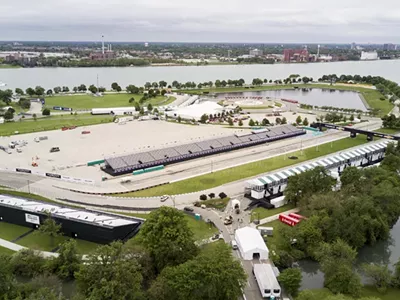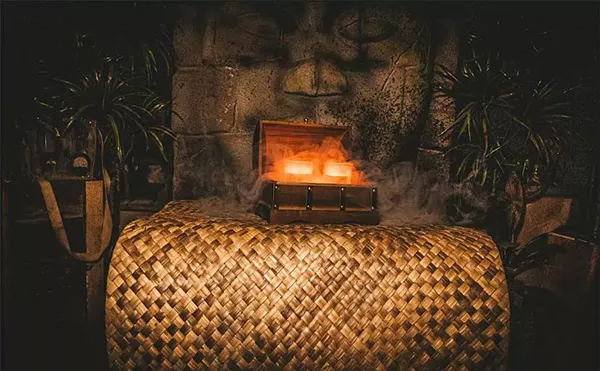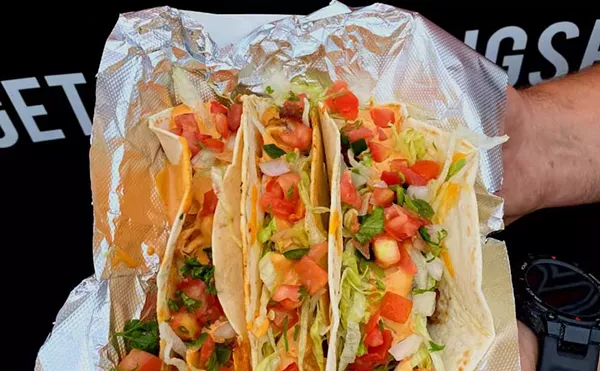
Audio By Carbonatix
[
{
"name": "GPT - Leaderboard - Inline - Content",
"component": "35519556",
"insertPoint": "5th",
"startingPoint": "3",
"requiredCountToDisplay": "3",
"maxInsertions": 100,
"adList": [
{
"adPreset": "LeaderboardInline"
}
]
}
]
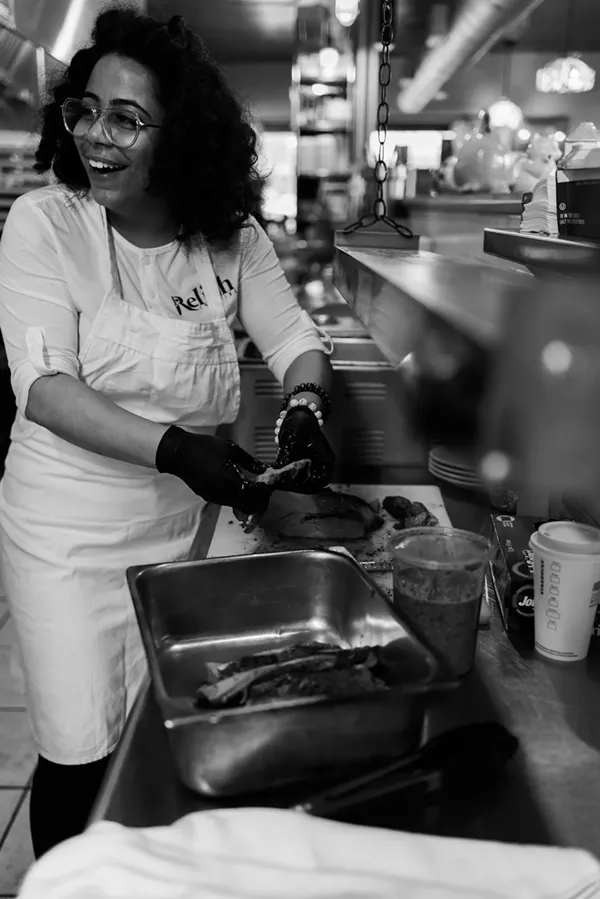
Courtesy of V.W. Photography.
Brittiany Peeler Of Relish Catering.
It’s pretty clear that those who have the most control over Detroit’s food system — its local growers, non-local growers, suppliers, producers, grocery store owners, distributors, restaurateurs, food writers, chefs, and so on — are mostly white.
That’s despite that the city’s population is nearly 90 percent people of color.
So it’s worth asking: How would things look if the food system centered around people of color and other marginalized groups instead of white people? A new project called the Dream Cafe and Community Food Hub spearheaded by FoodLab Detroit and Allied Media Conference is not just imagining that, but developing a model of “food production and service that is truly equitable, sustainable, cooperative, and community driven.”
And though there’s a deeper goal in the Dream Cafe, the June 14 through June 19 event is a welcoming celebration that includes a temporary full-service cafe run by local black-owned businesses that will take over the Cass Cafe; a series of pop-ups featuring local and visiting chefs; hands-on cooking workshops; and an outdoor market showcasing local producers. The entire event is made possible by collaborative partnerships among urban farmers, local producers, local chefs, visiting chefs, the chefs’ crews, and food sovereignty organizers. In that way, the event not only imagines how things could
Diners will find a wide range of foods and meals, from a Palestinian brunch to a pan-Caribbean feast to a cooking exchange hosted by a multigenerational group of indigenous chefs. Beyond the food, there will be
The endgame is culinary and economic sovereignty for marginalized
As FoodLab Detroit director Devita Davison puts it, Dream Cafe seeks to deconstruct and decolonize the food system, and instead center it around different cultures in a way that we don’t often see in Detroit, or elsewhere.
“What does it look like when you have folks not only from here but from all over the country who are black, brown, queer, nonconforming people — what does it look like when they dream about what the local food system can look like?” Davison asks. “This is what it looks like when you are dreaming about a food system that puts these people in the center, and you have a food system that represents them.”
“What does it look like to tear up every single negative notion about black and brown people, about their labor being undervalued, and start talking about how we can build something better together? This is what it looks like when you tear all of that shit up and come together and build.”
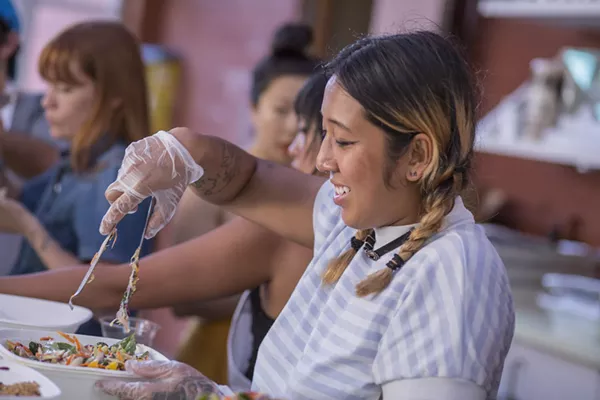
Courtesy photo
Chinchakriya Un of the Kreung pop up.
The project grew out of
“We’re applying that to food on an epic level this year,” Wise tells Metro Times. “We’re building out a food component intentionally designed to empower people and center the voices of people who are at the margins … and whose cultures are exploited by the food industry. And we will learn from and celebrate the brilliance and resilience of Detroit.”
FoodLab is running the full-service restaurant component of the Dream Cafe and bringing together their partner businesses. On June 14, Ryan Salter of Salt + Ko and Reniel Billups of Irie Occasions Catering will prepare breakfast; Friday will see Lamont Mitchell and Viana Rickett of Simple Goodness Detroit prepare breakfast with
FoodLab program associate
“People are going to be collaborating with each other in ways that they may not have before,” she says. “That’s the exciting part — building a circle and building relationships with each other and farmers of color. They can build on those relationships as they continue on with their businesses.”
FoodLab is also organizing the outdoor market, which will be held from 11 a.m. to 5 p.m. on June 15 and June 16 on The Commons lawn across the street from Cass Cafe. It will feature FoodLab members and black-owned businesses offering prepared foods, jams, teas, sauces, and
Among AMC’s exciting pop-ups is Matriarchy in the Kitchen, which Wise describes as “an incredible collaboration by women of color across generations who are telling a story about their food.” It’s an effort that features the cuisine of a queer black chef from the deep south and a young Trinidadian and Jamaican chef of Supper Club From Nowhere and
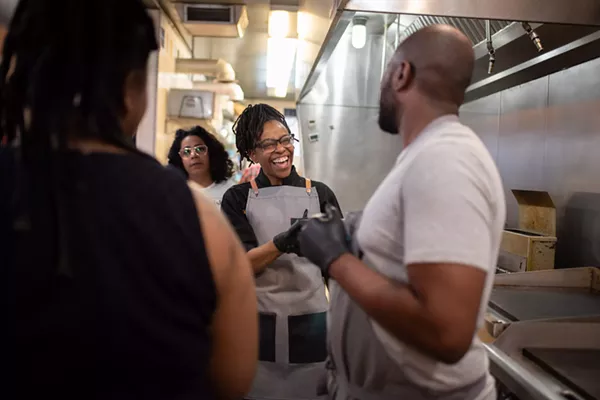
Courtesy of V.W. Photography.
Relish Catering co-owner Le’Genevieve Squires.
Chefs from all of Dream Cafe's events are mostly sourcing from 11 Detroit urban farmers of color, and the menus are largely designed around what those farms have available.
“We want to prioritize local growers, then work out from there,” Wise says. “The idea with all of this is to build capacity and deepen relationships within Detroit’s good food
Stepping back and looking at the sum of it all, the Dream Cafe really appears to be creating a small model of what could be carried out on a regional and national level.
“It’s ‘Local Food 2.0.’ This is the beta version,” Davison says. “We in beta, baby, and then we going to work out the kinks, work out all the bugs and we going to go across the country with it.”
Find out more information about each of the Dream Cafe's meals and purchase tickets (if applicable) at its schedule page, which is here.
Stay tuned to Metro Times for more on the event's menus and meals.
So many restaurants, so little time. Find out the latest Detroit dining news with our weekly food newsletter delivered every Friday morning.


